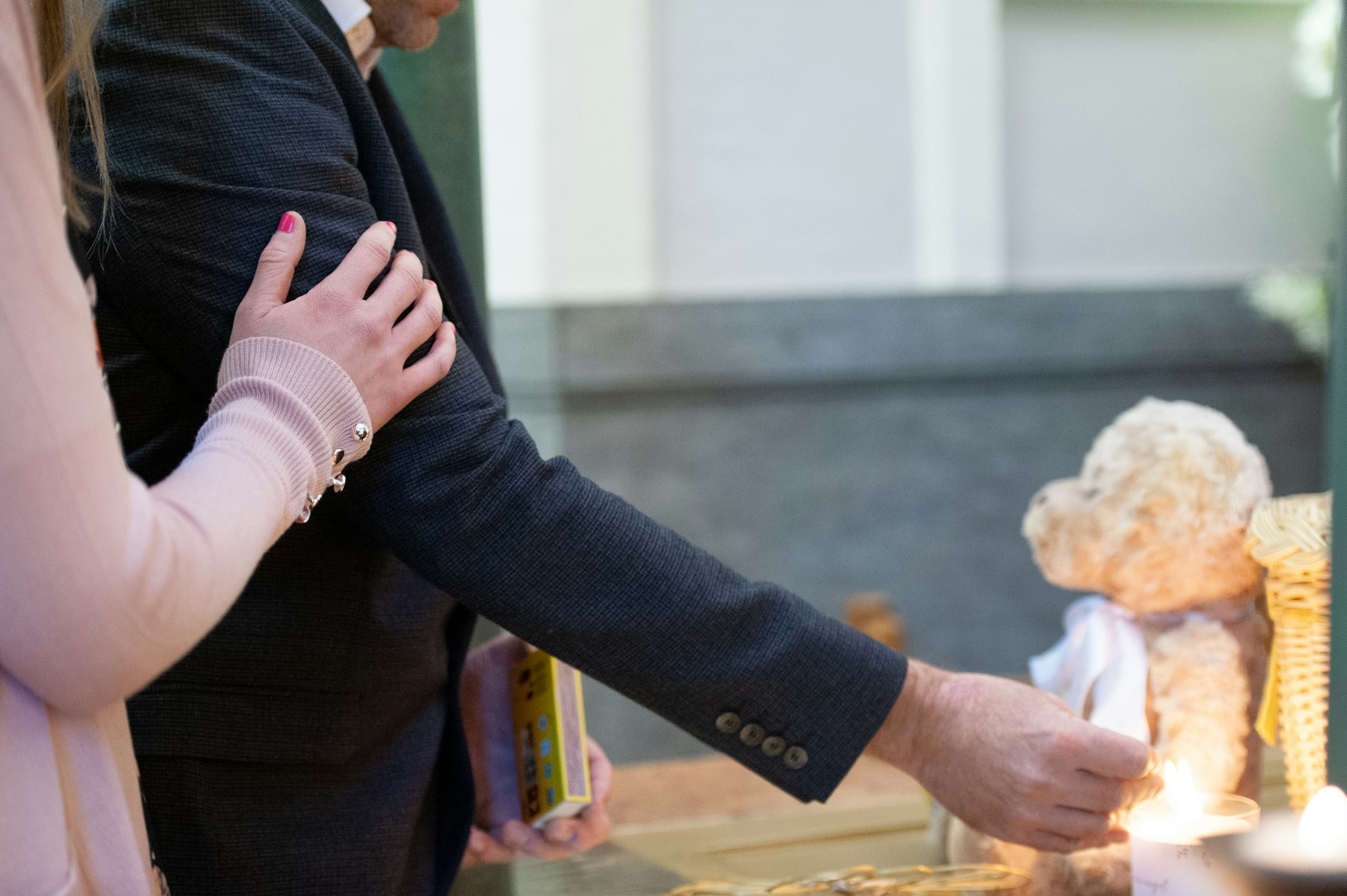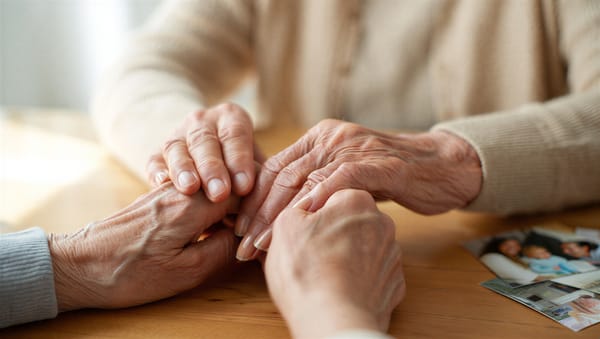Supporting Family Through Anniversary Grief: A Compassionate Guide
Learn how to support family members through anniversary grief with compassionate strategies, communication tips, and practical ways to help during difficult dates.

Support family during anniversary grief by offering specific help rather than "let me know if you need anything." Mark significant dates on your calendar and reach out before, during, and after. Provide practical assistance like meals or errands, acknowledge the difficulty of the day without minimizing their pain, and respect their individual way of grieving whether they want to talk about their person or need distraction. Consistent presence matters more than perfect words.
Key Takeaways
- Anniversary grief is a normal response to meaningful dates, and family members often experience it differently based on their relationship to the person who died
- The most helpful support combines presence without pressure, validation of feelings, and practical assistance with daily tasks
- Avoid phrases that minimize grief or suggest timelines; instead, acknowledge the difficulty of the day and offer specific help
- Creating space for both remembrance and normal activities respects each person's individual coping style
- Shared memorial practices, including tangible remembrance options, can help families feel connected while honoring their own grief expressions
Reflections on love, loss, and the the ways we carry them.
Anniversary grief has a way of settling quietly into a home long before the date arrives. You feel it in the way someone grows quieter, or how a usually steady voice begins to tremble when the day is mentioned. These reactions aren’t imagined—they’re the body remembering what the heart has never forgotten.
Families often ask me why certain dates feel like emotional earthquakes. Grief researchers remind us that anniversaries activate the brain’s memory pathways. Stirring not just thoughts, but sensations, emotions, even physical pain. The body keeps its own calendar, and sometimes it remembers before we do.
I think of Mylene, a client who lost her brother three years ago. As his birthday approached, she found herself unusually tired and achy, unable to focus. “I thought something was wrong with me,” she said. But when she recognized it as an anniversary reaction, her whole posture softened. She opted for a quiet morning, held a few of her brother’s Parting Stone pieces in her hand, and later shared one with her daughter. “It grounded me,” she told me. “It felt like bringing him along in the gentlest way.”
Supporting a loved one through anniversary grief doesn’t require grand gestures. It’s as simple as marking the date, sending a message that says, “I’m thinking of you,” or offering something concrete—dinner, company, a ride, a buffer.
And if you’re the one grieving, remember this: there is no correct way to move through an anniversary. Honor what feels true, allow your body its knowing, and choose rituals, traditional or new, that help you feel connected, held, and less alone.
Above all, trust this: grief may revisit, but so does love. Every single year.
Cathy Sanchez Babao
Parting Stone Grief Coach
You notice your sister has grown quieter as the date approaches. Your father mentions the upcoming anniversary with a heaviness in his voice. Your adult child seems irritable and withdrawn. Supporting family anniversary grief means recognizing these signs and offering meaningful help during the birthdays, death anniversaries, holidays, and milestone dates that intensify loss. The most effective support combines simple presence, validation of each person's unique response, and practical assistance that doesn't require them to articulate their needs during an already difficult time.
Understanding Anniversary Grief Reactions
Anniversary grief, also called anniversary reactions, occurs when specific dates trigger intensified feelings of loss. According to grief researchers and therapists, these reactions are neurologically rooted in how our brains encode memories with temporal and sensory markers. When a significant date approaches, the brain retrieves not just conscious memories but embodied experiences of loss.
Why Anniversaries Hit Differently
These dates function as grief amplifiers for several interconnected reasons. First, they represent what grief researchers call "symbolic loss," where the anniversary becomes a marker of all the moments that person will miss. A mother's birthday isn't just about her absence on that specific day; it represents every future birthday she won't celebrate.
Second, anniversaries often arrive with social expectations that conflict with internal emotional states. Holidays especially create pressure to feel or perform happiness, making the contrast with grief even more pronounced. Your family member might feel isolated by watching others celebrate while they're struggling to simply get through the day.
Third, the body sometimes remembers what the mind has pushed aside. In the weeks leading up to an anniversary, family members might experience physical symptoms, mood changes, or unexplained anxiety without consciously connecting these responses to the approaching date. This phenomenon, called somatic anniversary reactions, means supporting family grief anniversary needs to account for both emotional and physical manifestations.

A New Way to Hold Close What Matters Most
We transform cremated remains into beautiful, touchable stones that bring comfort when you need it. Something you can hold, share, and keep close.
The Ripple Effect Across Family Systems
Anniversary grief doesn't occur in isolation within families. When one person struggles with an anniversary, their distress affects the entire family system. Some members might minimize their own grief to protect others, creating what therapists call "grief hierarchies" where certain family members feel their loss is less legitimate.
"My daughter showed up the morning of the anniversary with groceries, walked my dog, and just sat with me while I looked through photos. She didn't try to cheer me up or make it better. That meant everything." - Robert T., Portland, OR
Understanding these dynamics helps you recognize that helping family grief anniversary often means acknowledging multiple, sometimes conflicting, grief expressions within one family unit.

Recognizing Different Family Grief Expressions
Family members grieve the same loss differently based on their unique relationship with the person who died, their attachment style, past loss experiences, and individual coping mechanisms. The Hospice Foundation of America notes that these variations are normal and healthy, not signs that anyone is grieving "wrong."
| Grief Expression Style | What It Looks Like | What They Need |
|---|---|---|
| Active Remembering | Talks frequently about memories, organizes memorial activities, visits grave sites | Space to share stories without others changing the subject; participation in remembrance rituals |
| Protective Withdrawal | Becomes quiet or isolated, deflects conversations, maintains busy schedule | Respect for their space while offering consistent, low-pressure connection; practical help they don't have to ask for |
| Emotion-Focused Processing | Openly cries, expresses intense feelings, seeks emotional conversations | Validation that their emotional intensity is acceptable; presence without attempts to fix or minimize |
| Cognitive Processing | Analyzes the loss, seeks meaning, asks existential questions | Patient listening without rushing to provide answers; acknowledgment that some questions have no resolution |
| Functional Coping | Channels grief into tasks, focuses on solving problems, stays productive | Recognition that activity is their way of managing pain, not avoiding grief; help prioritizing tasks |
Age-Specific Anniversary Responses
Children and adolescents experience anniversary grief differently than adults. According to child grief experts, younger children might not understand why they feel different as an anniversary approaches, while teenagers might intellectually understand anniversaries but struggle with emotional regulation during these times.
Adult children supporting grieving parents face unique challenges, including role reversal dynamics and their own grief for the loss of their family structure. Meanwhile, grieving parents supporting their children through the loss of a sibling or grandparent must balance their own pain with their protective instincts.

Practical Support Strategies That Actually Help
Supporting family anniversary grief requires moving beyond "let me know if you need anything" to specific, concrete offers that reduce decision-making burden during an already overwhelming time. Research from What's Your Grief emphasizes that the most helpful support anticipates needs rather than waiting to be asked.
Before the Anniversary Date
- Mark your calendar with their significant dates. This demonstrates the person wasn't forgettable to you either. Send a brief message a week before: "I'm thinking about you as Mom's birthday approaches. I'd love to bring dinner on Thursday, or we could take a walk if you'd prefer company."
- Offer specific logistical help. Anniversary dates often coincide with practical challenges: "I can pick up the kids from school that day so you have space for whatever you need" or "I blocked out that afternoon if you want company visiting the cemetery, or I can handle that errand you mentioned."
- Respect their existing plans while offering alternatives. Some family members have established rituals they want to maintain. Others might be dreading the day without a plan. "I know you usually spend his birthday at the lake. I'm available to join you, or I can check in with you the day after, whatever feels right."
- Prepare for practical needs they might not mention. Stock their fridge with easy meals. Fill their gas tank. Handle the task they've been postponing. These tangible actions communicate care without requiring them to articulate their needs.

During the Anniversary
The day itself requires balancing attentive presence with respect for their process. Your family member might need very different things hour by hour, and that unpredictability is normal.
- Show up without expectation of how the day should go. Be comfortable with silence, tears, laughter, anger, or numbness. Your steady presence matters more than orchestrating a specific experience.
- Follow their lead on remembering. Some want to talk extensively about their person. Others find it too painful. Pay attention to their cues rather than imposing your own comfort level with discussing the loss.
- Normalize the full range of responses. If they laugh at a memory, don't worry they're being disrespectful. If they want to watch TV and avoid the significance of the date, that's valid too. Anniversary grief support means accepting their choices without judgment.
- Protect them from insensitive interactions when possible. Screen phone calls. Handle the relative who says unhelpful things. Create buffer space from demands that drain their limited emotional resources.
After the Anniversary Passes
The support shouldn't disappear once the specific date has passed. According to grief counselor Megan Devine, the anticipation leading up to an anniversary and the emotional exhaustion following it can be harder than the day itself.
- Check in the day after and the week after. A simple "thinking about you today" or "that was a hard week" acknowledges that grief doesn't follow a calendar schedule.
- Recognize the cumulative toll of multiple anniversaries. First holidays, first birthdays, first everything without their person creates compounding loss. Anniversary grief family support means understanding that each "first" brings its own wave of intensified grief.
- Maintain consistent connection beyond significant dates. Regular, ongoing relationship matters more than grand gestures on specific days. The supportive text on a random Tuesday, the invitation to ordinary activities, the continued inclusion in family events - these sustain people through the long integration of loss.

Communication Approaches: What to Say and What to Avoid
Language matters profoundly when supporting family through anniversary dates. The American Psychological Association emphasizes that what we say either opens space for authentic grief expression or shuts it down through well-intentioned but harmful minimization.
Five Phrases That Help
- "I'm thinking about you as [date] approaches." This acknowledges the significance without forcing conversation. It tells them they're not alone in remembering.
- "There's no right way to handle this day. Whatever you need is okay." This removes performance pressure and validates their instincts about what they can handle.
- "I remember [specific detail about their person]." Sharing a particular memory demonstrates that their person mattered to you too and won't be forgotten.
- "This is so hard, and you don't have to do it alone." This combines validation with practical support offer.
- "I can't imagine what you're feeling, but I'm here." This admits your limitations honestly while offering genuine presence.
Five Phrases to Avoid
These common expressions, while meant to comfort, often cause pain:
- "They wouldn't want you to be sad." This creates guilt about natural grief responses and suggests there's a right way to grieve.
- "At least you had [X years] together." Any statement beginning with "at least" minimizes loss by suggesting they should feel grateful rather than grief-stricken.
- "You're so strong" or "I don't know how you do it." These phrases, while meant as compliments, can feel like pressure to maintain a facade of coping when they're actually struggling.
- "Let me know if you need anything." While kind-intentioned, this places burden on the grieving person to identify and articulate needs during a time when that's especially difficult.
- Comparing losses or sharing your own grief stories. Unless specifically asked, centering your own experience shifts focus away from supporting them.
"The people who helped most were the ones who just said 'This is terrible and unfair, and I'm sorry.' They didn't try to find silver linings or tell me how I should feel." - Jennifer K., Austin, TX 🖤

Long-Term Support: Beyond the Immediate Anniversary
Memorial date family help extends far beyond the annual occurrence of specific dates. Research from the Canadian Psychological Association shows that anniversary reactions can continue for many years, and their intensity doesn't follow a predictable decline. Some years hit harder than others based on life circumstances, stress levels, and what else is happening in that person's life.
Understanding the Long Arc of Anniversary Grief
The fifth anniversary might be harder than the second. The tenth might surprise everyone with its intensity. Life transitions - marriages, births, moves, career changes - can reactivate anniversary grief even years later because they highlight the absence of the person who should be there celebrating or advising.
"No one expected me to struggle so much on the ten-year anniversary of my husband's death. But my daughter was getting married, and he should have been there to walk her down the aisle. That anniversary hit me harder than any before it." - Catherine L., Minneapolis, MN 🖤
Supporting family members means understanding this non-linear nature and not expressing surprise or concern when someone has a difficult anniversary after years of seemingly doing well. Grief doesn't end; it integrates into a changed life, and anniversaries can temporarily disrupt that integration.
Creating Sustainable Support Systems
Rather than exhausting yourself with intensive support during each anniversary, build sustainable patterns of connection:
- Establish regular check-in rhythms. Monthly phone calls, standing coffee dates, or weekly texts create consistency that doesn't spike and disappear around difficult dates.
- Include them in your ongoing life. Continued invitations to normal activities matter as much as anniversary-specific support. Grieving people need both acknowledgment of their loss and inclusion in regular living.
- Build community support beyond yourself. Encourage connections with grief support groups, faith communities, or therapy where appropriate. One person can't meet all support needs, and that's healthy for everyone involved.
- Take care of your own well-being. Supporting someone through years of anniversary grief requires maintaining your own emotional resources. Compassion fatigue is real, and recognizing your limitations helps you provide better long-term support.
Shared Memorial Practices and Tangible Remembrance
Many families find that anniversary grief support is enhanced through intentional memorial practices that honor both collective remembrance and individual grief expressions. These rituals provide structure during otherwise overwhelming days while allowing each person to participate in ways that feel meaningful to them.
Creating Flexible Memorial Traditions
Effective family memorial practices balance consistency with flexibility. Some families gather at the same restaurant each year to share favorite stories. Others plant trees, make donations to meaningful causes, or visit places that held significance. The specific activity matters less than creating space for remembrance that respects different comfort levels with emotional expression.
"Friends and family joyfully accept and even request parting stones - some to keep, some to leave at places memorable to them and our departed loved one. As a widow, I found Parting Stones to be a valuable and comforting way to grieve, to remember shared experiences and to invite my late husband along on new adventures." - Mary K., Prescott, AZ 🖤
For families seeking tangible remembrance options, various memorial approaches allow each person to maintain personal connection. Traditional urns, memorial jewelry, and planted remembrances each serve different needs. For families who find comfort in shared tangible elements, Parting Stone's solidified remains service transforms cremated remains into 40-80+ smooth, touchable stones through a patented scientific process. At $2,495 for human remains solidification, this option allows families to divide stones among members, so each person can have their own memorial element during anniversary dates while maintaining shared connection to their loved one. This can be particularly meaningful when family members live in different locations or have varying relationships with traditional memorial practices.
"I have been able to quietly and privately place stones in places that were meaningful to us through our 53 years together, share them with family and the closest of friends, and keep a few close to favorite photographs. They are a beautiful and comforting presence." - Lynn C., Houston, TX 🖤
Balancing Remembrance with Living
Anniversary grief support doesn't mean every difficult date must center entirely on loss. Many families find that mixing remembrance with ordinary activities - watching a favorite movie together, cooking a beloved recipe, engaging in the person's favorite hobby - honors their person while also allowing space for living. This both/and approach recognizes that supporting family anniversary grief means validating sadness while also permitting moments of lightness, laughter, and normalcy.

When to Suggest Professional Support
Understanding the boundaries of peer support helps you recognize when memorial date family help should include encouraging professional grief counseling or therapy. According to Hospice Foundation of America, most anniversary reactions, while painful, don't require clinical intervention. However, certain signs indicate that professional support would be beneficial.
Signs That Suggest Professional Grief Support
- Increasing isolation over time. If your family member progressively withdraws from relationships, activities, and life engagement as anniversaries approach or pass.
- Inability to function in daily responsibilities. Missing work repeatedly around anniversaries, inability to care for children, or persistent neglect of basic self-care beyond the immediate anniversary period.
- Substance use to manage anniversary emotions. Increasing reliance on alcohol, drugs, or other substances to numb grief intensity.
- Persistent thoughts of self-harm. Any mention of wanting to die or be with their deceased person requires immediate attention and support.
- Anniversary reactions that intensify rather than integrate over multiple years. While grief doesn't disappear, most people develop some capacity to manage anniversary dates over time. Reactions that become more debilitating with each passing year may indicate complicated grief.
How to Suggest Professional Help Compassionately
Raising the idea of therapy requires sensitivity to avoid seeming critical of their grief or implying they're not coping adequately:
"I've noticed these anniversaries are really taking a toll on you. I'm wondering if talking with someone who specializes in grief might give you some additional tools. I'll support you however I can, and I think a grief counselor could offer perspectives I can't."
Present professional support as an addition to your relationship, not a replacement for it. Many people resist therapy out of fear that it means they're failing at grief or that seeking help implies family support isn't enough. Reassure them that professional support and family support serve different, complementary purposes.

Self-Care for Family Supporters
Grief support anniversary work affects the supporters too. Witnessing someone you love experience repeated pain, feeling helpless to relieve their suffering, and managing your own grief for the same person creates secondary stress that requires attention.
Recognizing Compassion Fatigue
According to grief support resources, family members providing long-term grief support often experience compassion fatigue - emotional exhaustion from sustained empathetic engagement. Signs include irritability, feeling drained after interactions with the grieving person, difficulty sleeping around their anniversaries, and resentment about support expectations.
These responses don't mean you're selfish or uncaring. They signal that you need to replenish your own emotional resources. Ignoring compassion fatigue leads to burnout that ultimately reduces your capacity to provide meaningful support.
Building Your Own Support System
- Talk with others outside the immediate situation. Friends, therapists, or support groups for family members of grieving people provide space to process your own feelings without burdening the person you're supporting.
- Set realistic expectations for what you can provide. You cannot eliminate their pain, prevent difficult anniversaries, or grieve on their behalf. Accepting these limitations reduces the pressure you might be placing on yourself.
- Maintain boundaries around your own well-being. It's appropriate to say "I need to take care of something this afternoon, but I can check in with you tonight" or "I'm feeling depleted today; can we talk tomorrow?"
- Acknowledge your own relationship to the loss. If you're supporting a sibling through the anniversary of a parent's death, you're also grieving that parent. Your grief deserves attention too, even as you support others.
"I finally realized I couldn't pour from an empty cup. Taking care of myself wasn't selfish; it meant I could actually show up for my dad in the ways that mattered." - Michael R., Seattle, WA 🖤
FAQ Section
How long does anniversary grief last?
Anniversary grief reactions can continue indefinitely, though their intensity and duration typically vary from year to year. Most people experience some form of heightened emotion around significant dates throughout their lives, but this doesn't mean the grief is unresolved. Anniversary reactions are a normal part of continuing bonds with deceased loved ones and often represent love persisting rather than inability to adapt to loss.
What are the signs someone is experiencing anniversary grief?
Common signs include mood changes (sadness, irritability, anxiety) in the weeks before an anniversary date, changes in sleep or appetite, physical symptoms like headaches or fatigue, social withdrawal, increased crying, difficulty concentrating, and intensified longing for the deceased person. Some people experience these reactions without consciously connecting them to the approaching anniversary date.
Should I mention the anniversary if they haven't brought it up?
Yes, acknowledging the upcoming anniversary shows you remember their person and recognize the day's significance. A simple "I'm thinking about you as [date] approaches" opens space for them to share if they want to, without pressure to respond in any particular way. Most grieving people appreciate having their loss acknowledged rather than ignored.
What should I say to someone experiencing anniversary grief?
Simple, direct acknowledgments work best: "I'm thinking about you today," "This must be such a hard day," "I remember [their person's name] too," or "There's no right way to feel today - whatever you're experiencing is okay." Avoid phrases that minimize grief or suggest they should be feeling better, and focus on validation and presence rather than trying to fix their pain.
How can I help a family member who withdraws during anniversary times?
Respect their need for space while maintaining gentle, consistent connection. Send brief texts that don't require response, leave prepared meals on their doorstep, or offer specific help with practical tasks. Let them know you're available without pressure: "I'm here if you want company, and I understand if you need to be alone. I'll check in tomorrow." Continue reaching out even if they don't respond, as your consistency demonstrates reliable support.
References
American Psychological Association. (2024). Grief. https://www.apa.org/topics/grief
Best Self Therapy. (2024). Anniversaries in grief. https://bestselftherapy.net/blog/anniversaries-in-grief
Canadian Psychological Association. (2024). Psychology works fact sheet: Grief in adults. https://cpa.ca/psychology-works-fact-sheet-grief-in-adults/
Cruse Bereavement Support. (2021). Coping with anniversaries and reminders. https://www.cruse.org.uk/understanding-grief/managing-grief/coping-with-anniversaries-and-reminders/
Devine, M. (2025). Refuge in grief. https://refugeingrief.com/
Hospice Foundation of America. (2024). Three C's for coping with grief. https://hospicefoundation.org/three-c-s-for-holiday-grief/
Hospice Foundation of America. (2024). When you are grieving. https://hospicefoundation.org/when-you-are-grieving/
What's Your Grief. (2013). Coping with a loved one's death anniversary. https://whatsyourgrief.com/dealing-with-the-anniversary-of-a-loved-ones-death/
What's Your Grief. (2023). The death anniversary several years later. https://whatsyourgrief.com/death-anniversary-years-later/











